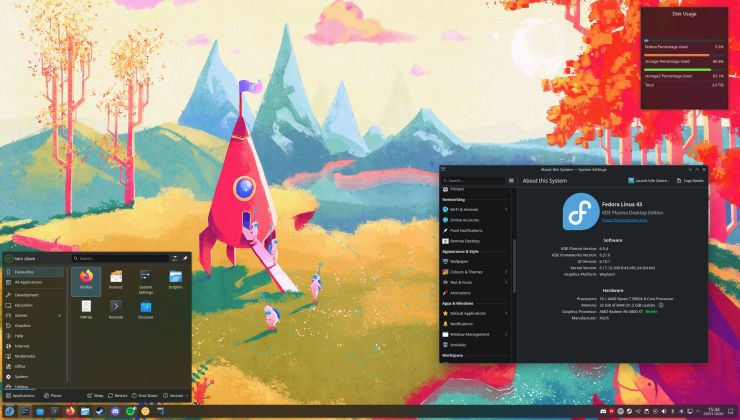Canonical announced some time ago their Steam Snap which was promoted as stable with Ubuntu 23.04, as they continue to push their own packaging format with Snap but it seems this has been causing problems for Valve.
Writing on Mastodon, developer Timothee "TTimo" Besset, who works on various things for Valve posted asking people to consider using the official Valve .deb package or at least consider using the Flatpak:
Valve is seeing an increasing number of bug reports for issues caused by Canonical's repackaging of the Steam client through snap.
The best way to install Steam on Debian and derivative operating systems is to follow the instructions at http://repo.steampowered.com/steam/ and use the official .deb
We are not involved with the snap repackaging. It has a lot of issues.
If you don't want the .deb, please at least consider the flatpak version.
Timothee "TTimo" Besset
So if you've been having various problems with Steam on Ubuntu (or a derivative like Kubuntu), it may be because you've installed it as a Snap. Worth trying out the official .deb or Flatpak to see if it runs better for you. You can also give Canonical feedback in your issues on their Discourse Forum and report issues to Valve on GitHub (if you're using their official packages).
Hopefully Canonical can look into any issues.
Would be great if Valve would officially support Steam Flatpak, it would cover a lot more distros than just the Debian family but I believe it wouldn't be that much more work since it uses specific versions of Flatpak runtimes.
Edit: Also, funny how they hired more devs to work on Snap support in other distros while their own doesn't work properly yet.
Last edited by kerossin on 17 Jan 2024 at 6:25 pm UTC
A lot of work has also been done to make it even more suitable for GUI applications. For example, Firefox works with the integration of GNOME extensions, unlike the flatpak version.
Please also note that practically all STS releases have been partly experimental, so Steam is offered there in snap format.
And finally, it is Canonical itself that monitors this client and does not hide it. If many complain specifically to Valve that the snap client does not work well, then the problem is precisely the misunderstanding by users, and not that "snap is bad." This would be true for flatpak if it had a similar problem.
Disclaimer: An active Ubuntu fan since 2017 :)
It crashed and rebooted my whole system.
Last edited by pb on 17 Jan 2024 at 9:03 pm UTC
Quoting: KimyrielleI am thinking of a really compelling reason to containerize Steam and can't come up with one...Not even one? I have an easy one. First, Steam is proprietary. Valve does do a lot of great FOSS work, and they are generally trustworthy, but Steam itself is still proprietary at the end of the day. And it has made catastrophic mistakes before. Containerizing it limits the scope of the damage it can possibly do.
That's not it, either. I have about... 800+ additional reasons, at least in my Steam library. A whole litany of proprietary, closed-source games. Only a fraction of them are native, and would have hypothetically unfettered access to the whole filesystem when unsandboxed, but that's enough to prefer to be safe rather than sorry. Steam does have its own container runtimes, Soldier and Sniper, but most native binaries don't use them. Proton is their main consumer, actually.
But containerization isn't just about sandboxing. It's about smoothing over the differences between distros that can randomly break applications. Providing libraries that are consistent and compatible across all base distros. You can even have glibc in a musl distro. The custom set of libraries provided by your base distro are a good thing for your system apps and desktop environment, but not so good for binary-only applications. By containerizing Steam, you can give it the consistent, stable libraries that it wants for its games, while letting your system apps and desktop environment continue to take advantage of your base distro's custom libraries. Because of this, more than anything else, Flathub's Steam package is more likely to work than whatever your base distro is doing to adapt the .deb provided by Valve.
Last edited by TiZ on 17 Jan 2024 at 7:43 pm UTC
Quoting: KimyrielleI am thinking of a really compelling reason to containerize Steam and can't come up with one...The flatpak at least simplifies the story around the 32-bit libs steam still uses and updsting the rest of the system in a timely and non-breaking fashion. Fedora blocked my system update several times because of the steam required libs not matching what the repos had. And while less useful for Arch in that sense it did help me debug a couple of issues i was having with my controller
Quoting: kerossinI've been running Steam Flatpak on openSUSE Tumbleweed for over a year (maybe 2 years, can't remember) and had no problems.Don't they already support flatpak version of Steam? Isn't that what the Steamdeck uses? (Maybe not, I'd have to look).
Would be great if Valve would officially support Steam Flatpak, it would cover a lot more distros than just the Debian family but I believe it wouldn't be that much more work since it uses specific versions of Flatpak runtimes.
Edit: Also, funny how they hired more devs to work on Snap support in other distros while their own doesn't work properly yet.
Quoting: TiZNot even one? I have an easy one. First, Steam is proprietary. Valve does do a lot of great FOSS work, and they are generally trustworthy, but Steam itself is still proprietary at the end of the day. And it has made catastrophic mistakes before. Containerizing it limits the scope of the damage it can possibly do.I love open source software as much as anyone, but let's be real here. There are plenty of super serious bugs in OSS applications, too. Saying that anything proprietary is untrustworthy by design is a bit over the top. With your logic, you'd need to containerize EVERYTHING, and the result of this would be a a fairly unproductive and ineffective system. I get containerization for high-risk applications (yes, like the internet browser), but locking software from trustworthy vendors inside a container is a bit much on the paranoid side.
That's not it, either. I have about... 800+ additional reasons, at least in my Steam library. A whole litany of proprietary, closed-source games. Only a fraction of them are native, and would have hypothetically unfettered access to the whole filesystem when unsandboxed, but that's enough to prefer to be safe rather than sorry. Steam does have its own container runtimes, Soldier and Sniper, but most native binaries don't use them. Proton is their main consumer, actually.
Quoting: slaapliedjeDon't they already support flatpak version of Steam? Isn't that what the Steamdeck uses? (Maybe not, I'd have to look).Flatpak Steam is also unsupported.
The Deck doesn't use flatpak Steam.
Quoting: KimyrielleI am thinking of a really compelling reason to containerize Steam and can't come up with one...Beyond what's already been pointed out, how about [not getting most of your drive wiped out](https://www.reddit.com/r/archlinux/comments/2stuh2/security_psa_steam_for_linux_recursively_deletes/)?
Quoting: KimyrielleI don't really have a horse in this race, but I think TiZ is referring to the time Steam wiped everything on the user's drive: https://github.com/ValveSoftware/steam-for-linux/issues/3671Quoting: TiZNot even one? I have an easy one. First, Steam is proprietary. Valve does do a lot of great FOSS work, and they are generally trustworthy, but Steam itself is still proprietary at the end of the day. And it has made catastrophic mistakes before. Containerizing it limits the scope of the damage it can possibly do.I love open source software as much as anyone, but let's be real here. There are plenty of super serious bugs in OSS applications, too. Saying that anything proprietary is untrustworthy by design is a bit over the top. With your logic, you'd need to containerize EVERYTHING, and the result of this would be a a fairly unproductive and ineffective system. I get containerization for high-risk applications (yes, like the internet browser), but locking software from trustworthy vendors inside a container is a bit much on the paranoid side.
That's not it, either. I have about... 800+ additional reasons, at least in my Steam library. A whole litany of proprietary, closed-source games. Only a fraction of them are native, and would have hypothetically unfettered access to the whole filesystem when unsandboxed, but that's enough to prefer to be safe rather than sorry. Steam does have its own container runtimes, Soldier and Sniper, but most native binaries don't use them. Proton is their main consumer, actually.
(With how cold it's been here lately this GIF is even more fitting than it'd normally be. lol)
Quoting: TiZ100% this. "anti-cheats" *cough* *cough* kErNeL r00tk1Ts -- for now I have completely separate machines for Linux Gaming vs Desktop, and the Steam Deck does a great job Appliancizing and air gapping proprietary access by who knows which panaroid schitzo government to our machines.Quoting: KimyrielleI am thinking of a really compelling reason to containerize Steam and can't come up with one...Not even one? I have an easy one. First, Steam is proprietary. [..] That's not it, either. I have about... 800+ additional reasons, at least in my Steam library. A whole litany of proprietary, closed-source games. Only a fraction of them are native, and would have hypothetically unfettered access to the whole filesystem when unsandboxed, but that's enough to prefer to be safe rather than sorry.
Anyways, steam is a saint but there is a big difference between the store(s) and the publisher(s) in terms of ethos, ethics, and vision -- not all of them share the opinion that consumers are people or have human rights to privacy or dignity.
Valve posted asking people to consider using the official Valve .deb packagePlease, please, please, please not!
I'm reading nearly every thread in the Steam for Linux forum, and we hear problems from people having used the downloadable deb for over a decade now! People should use what their distribution made of it, adding their dependencies and such. I cannot believe Valve proposes to actually use that!
Last edited by Eike on 18 Jan 2024 at 12:45 pm UTC











 How to setup OpenMW for modern Morrowind on Linux / SteamOS and Steam Deck
How to setup OpenMW for modern Morrowind on Linux / SteamOS and Steam Deck How to install Hollow Knight: Silksong mods on Linux, SteamOS and Steam Deck
How to install Hollow Knight: Silksong mods on Linux, SteamOS and Steam Deck